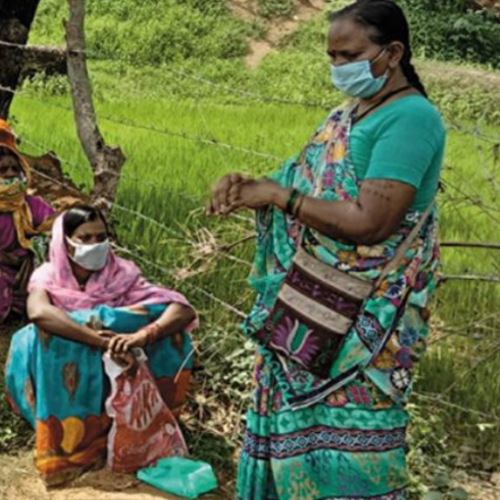
In the News
Big story: Making it Work for Women
- Forbes India
-
Focus Areas
Global Health, Women, Youth & Children -
Issues
Nutrition & Food Security, Reproductive & Sexual Health, Rural Health, Violence Prevention -
Expertise
Leadership Development -
Programs
Collective Impact Partnership: Increasing the Economic Power of Girls and Women in India, Rise Up(PHI program 2009–2025)
In India, more rural women than men have lost their jobs due to the pandemic. COVID-19 has disproportionately affected women’s labor force participation there (71% of rural women casual workers lost their livelihoods during the lockdown, compared to 59% of men) and they could be the key to building a stronger economic revival.
A 2018 Harvard Business Review report states that globally, for every 10 percent increase in women working, there is a 5 percent increase in wages, including for men, since the overall productivity levels of the regions with better female labor force participation (FLFP) increase.
Yet, in India, when the economy slows down and jobs start disappearing, women’s livelihoods have often been the first to be hit. The 2020 World Economic Forum’s Global Gender Gap report ranks India at 149 out of 153 countries when it comes to economic participation and opportunity for women. According to the report, only 35 percent of the financial gap between women and men has been covered. Rural women particularly fall out of the workforce at a much sharper rate than urban women.
Cultivating community leaders would help the government reach the most marginalized people effectively, believes Nikita Wadhwa, programme coordinator for Collective Impact Partnership, a PHI initiative that supports local women who undertake leadership roles by helping others in their community. “They work closely with decision makers to ensure that women can access government schemes and policies meant to empower them, and work to address systemic barriers and gaps,” she says.
Kumaribai Jamakatan, 51, is one such tribal woman from Gadchiroli district in Maharashtra. Women in the area depend mostly on selling mahua flowers, or forest produce like tendu leaves and bamboo. While the latter could not be carried out during the lockdown, the market price for mahua fell from ₹30 per kg to ₹15 or ₹18 per kg.

Kumaribai Jamakatan, Collective Impact Partnership local leader.
“This caused a lot of mental anguish as many women did not even have money to run their households. So I ensured that I connected with them regularly to address their issues, and make them aware of all the social security benefits they can avail, be it free gas cylinders under the Ujjwala Yojana, or ₹500 in their Jan Dhan accounts. The self-help groups are not able to meet and training sessions have stopped, but we women ensure we keep each other’s morale high.”
Click below to read the full story in Forbes India.
Originally published by Forbes India
More Updates
Work With Us
You change the world. We do the rest. Explore fiscal sponsorship at PHI.
Support Us
Together, we can accelerate our response to public health’s most critical issues.
Find Employment
Begin your career at the Public Health Institute.



